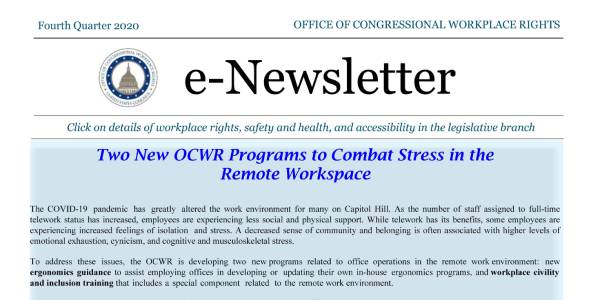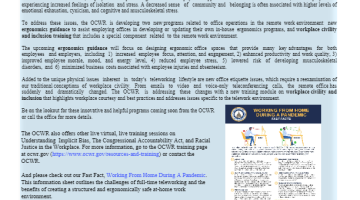Two New OCWR Programs to Combat Stress in the Remote Workspace
The COVID-19 pandemic has greatly altered the work environment for many on Capitol Hill. As the number of staff assigned to full-time telework status has increased, employees are experiencing less social and physical support. While telework has its benefits, some employees are experiencing increased feelings of isolation and stress. A decreased sense of community and belonging is often associated with higher levels of emotional exhaustion, cynicism, and cognitive and musculoskeletal stress.
To address these issues, the OCWR is developing two new programs related to office operations in the remote work environment: new ergonomics guidance to assist employing offices in developing or updating their own in-house ergonomics programs, and workplace civility and inclusion training that includes a special component related to the remote work environment.
The upcoming ergonomics guidance will focus on designing ergonomic office spaces that provide many key advantages for both employees and employers, including 1) increased employee focus, attention, and engagement, 2) enhanced productivity and work quality, 3) improved employee morale, mood, and energy level, 4) reduced employee stress, 5) lowered risk of developing musculoskeletal disorders, and 6) minimized business costs associated with employee injuries and absenteeism.
Added to the unique physical issues inherent in today’s teleworking lifestyle are new office etiquette issues, which require a reexamination of our traditional conceptions of workplace civility. From emails to video and voice-only teleconferencing calls, the remote office has suddenly and dramatically changed. The OCWR is addressing these changes with a new training module on workplace civility and inclusion that highlights workplace courtesy and best practices and addresses issues specific to the telework environment.
Be on the lookout for these innovative and helpful programs coming soon from the OCWR or call the office for more details.

